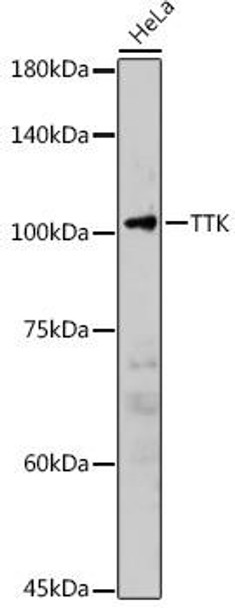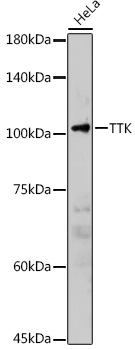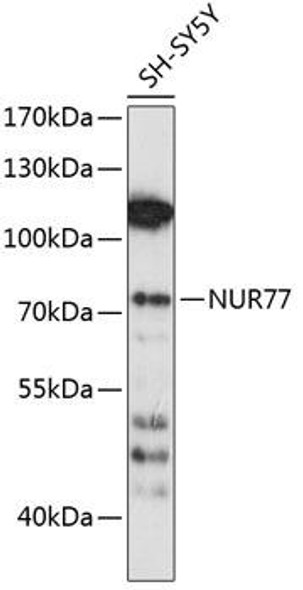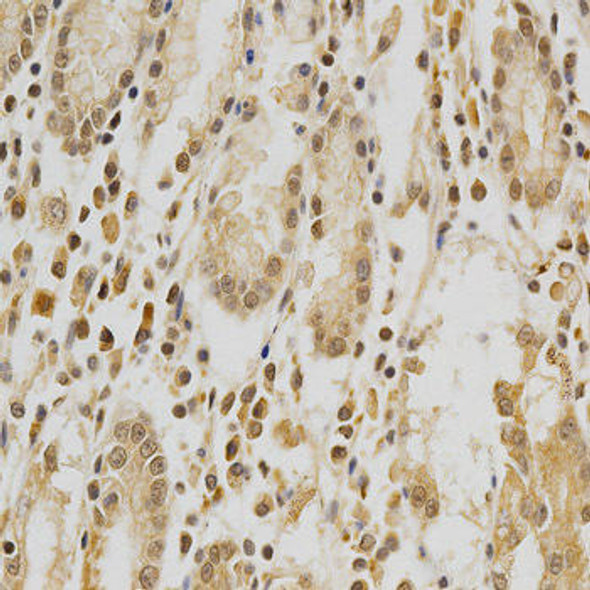Description
Anti-TTK Antibody (CAB2500)
The TTK Polyclonal Antibody (CAB2500) is a powerful tool for researchers studying the TTK protein, a key player in cell division and mitosis regulation. This antibody, produced in rabbits, exhibits high specificity for human samples and has been validated for use in Western blotting applications. By targeting the TTK protein, researchers can accurately detect and analyze its expression in various cell types, making it ideal for investigations into cancer biology and cell cycle regulation.TTK, also known as monopolar spindle 1 (MPS1), is essential for proper chromosome segregation and faithful cell division. Dysregulation of TTK has been linked to genomic instability and tumor development, highlighting its potential as a therapeutic target in cancer treatment.
By studying TTK activity, researchers can gain valuable insights into the mechanisms of tumorigenesis and identify novel strategies for cancer therapy.For researchers interested in unraveling the complexities of cell division and exploring new avenues for cancer treatment, the TTK Polyclonal Antibody (CAB2500) offers a reliable tool for investigating the role of TTK in cellular processes and disease progression. Trust in this antibody to provide accurate and reproducible results for your research endeavors.
| Antibody Name: | Anti-TTK Antibody |
| Antibody SKU: | CAB2500 |
| Antibody Size: | 20uL, 50uL, 100uL |
| Application: | WB IF |
| Reactivity: | Human, Mouse, Rat |
| Host Species: | Rabbit |
| Immunogen: | Recombinant fusion protein containing a sequence corresponding to amino acids 517-856 of human TTK (NP_001160163.1). |
| Application: | WB IF |
| Recommended Dilution: | WB 1:500 - 1:2000 IF 1:50 - 1:200 |
| Reactivity: | Human, Mouse, Rat |
| Positive Samples: | HeLa |
| Immunogen: | Recombinant fusion protein containing a sequence corresponding to amino acids 517-856 of human TTK (NP_001160163.1). |
| Purification Method: | Affinity purification |
| Storage Buffer: | Store at -20'C. Avoid freeze / thaw cycles. Buffer: PBS with 0.02% sodium azide, 50% glycerol, pH7.3. |
| Isotype: | IgG |
| Sequence: | ISVK GRIY SILK QIGS GGSS KVFQ VLNE KKQI YAIK YVNL EEAD NQTL DSYR NEIA YLNK LQQH SDKI IRLY DYEI TDQY IYMV MECG NIDL NSWL KKKK SIDP WERK SYWK NMLE AVHT IHQH GIVH SDLK PANF LIVD GMLK LIDF GIAN QMQP DTTS VVKD SQVG TVNY MPPE AIKD MSSS RENG KSKS KISP KSDV WSLG CILY YMTY GKTP FQQI INQI SKLH AIID PNHE IEFP DIPE KDLQ DVLK CCLK RDPK QRIS IPEL LAHP YVQI QTHP VNQM AKGT TEEM KYVL GQLV GLNS PNSI LKAA KTLY EHYS GGES HNSS SSKT FEKK RGKK |
| Gene ID: | 7272 |
| Uniprot: | P33981 |
| Cellular Location: | |
| Calculated MW: | 96kDa/97kDa |
| Observed MW: | 100KDa |
| Synonyms: | TTK, CT96, ESK, MPH1, MPS1, MPS1L1, PYT |
| Background: | This gene encodes a dual specificity protein kinase with the ability to phosphorylate tyrosine, serine and threonine. Associated with cell proliferation, this protein is essential for chromosome alignment at the centromere during mitosis and is required for centrosome duplication. It has been found to be a critical mitotic checkpoint protein for accurate segregation of chromosomes during mitosis. Tumorigenesis may occur when this protein fails to degrade and produces excess centrosomes resulting in aberrant mitotic spindles. Alternative splicing results in multiple transcript variants. |
| UniProt Protein Function: | TTK: a dual-specificity protein kinase orthologous to the yeast monopolar spindle (Mps1) kinase that is required for spindle pole duplication and the spindle checkpoint but not for centrosome duplication. Localized to centrosomes, kinetochores and nuclear pores. Its enzymatic activity is required for the recruitment of Mad1, Mad2, Bub1 and Bub3 to the kinetochore. Mps1 mRNA levels change little throughout the cell cycle, but its protein expression varies during the cell cycle. Overexpression arrests cells in metaphase by activating the checkpoint. |
| UniProt Protein Details: | Protein type:Protein kinase, Other; Kinase, protein; Protein kinase, dual-specificity (non-receptor); EC 2.7.12.1; Cancer Testis Antigen (CTA); Other group; TTK family Chromosomal Location of Human Ortholog: 6q14.1 Cellular Component: membrane; spindle Molecular Function:protein binding Biological Process: mitotic cell cycle spindle assembly checkpoint; mitotic spindle organization and biogenesis; positive regulation of cell proliferation; spindle organization and biogenesis |
| NCBI Summary: | This gene encodes a dual specificity protein kinase with the ability to phosphorylate tyrosine, serine and threonine. Associated with cell proliferation, this protein is essential for chromosome alignment at the centromere during mitosis and is required for centrosome duplication. It has been found to be a critical mitotic checkpoint protein for accurate segregation of chromosomes during mitosis. Tumorigenesis may occur when this protein fails to degrade and produces excess centrosomes resulting in aberrant mitotic spindles. Alternative splicing results in multiple transcript variants. [provided by RefSeq, Nov 2009] |
| UniProt Code: | P33981 |
| NCBI GenInfo Identifier: | 160112977 |
| NCBI Gene ID: | 7272 |
| NCBI Accession: | P33981.2 |
| UniProt Secondary Accession: | P33981,Q15272, Q5TCS0, Q9BW51, Q9NTM0, A8K8U5, B2RDW2 E1P543, |
| UniProt Related Accession: | P33981 |
| Molecular Weight: | 96,944 Da |
| NCBI Full Name: | Dual specificity protein kinase TTK |
| NCBI Synonym Full Names: | TTK protein kinase |
| NCBI Official Symbol: | TTK |
| NCBI Official Synonym Symbols: | ESK; PYT; CT96; MPH1; MPS1; MPS1L1 |
| NCBI Protein Information: | dual specificity protein kinase TTK |
| UniProt Protein Name: | Dual specificity protein kinase TTK |
| UniProt Synonym Protein Names: | Phosphotyrosine picked threonine-protein kinase; PYT |
| Protein Family: | Protein tramtrack |
| UniProt Gene Name: | TTK |
| UniProt Entry Name: | TTK_HUMAN |





